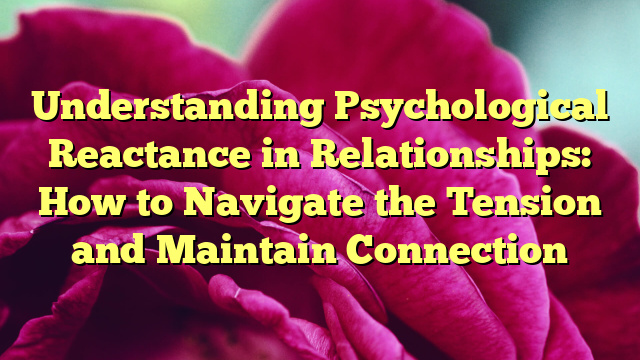Understanding Psychological Reactance in Relationships: How to Navigate the Tension and Maintain Connection
Understanding Psychological Reactance in Relationships: How to Navigate the Tension and Maintain Connection
Introduction
Relationships can be complex and challenging, often requiring a delicate balance between individual autonomy and connection with a partner. One psychological concept that can significantly impact relationships is psychological reactance. Understanding psychological reactance and learning how to navigate the tension it creates can help maintain a healthy and fulfilling connection with your partner.
What is Psychological Reactance?
Psychological reactance refers to the emotional and cognitive response individuals experience when they perceive their freedom or autonomy is being threatened or restricted. It is a natural reaction to feeling controlled or coerced, and it can manifest in various ways within relationships.
When one partner feels their autonomy is being challenged, they may respond with resistance, defiance, or even rebellion. This can lead to conflicts, power struggles, and a breakdown in communication and intimacy.
The Role of Autonomy in Relationships
Autonomy is a fundamental human need, and it plays a crucial role in healthy relationships. Each individual needs to feel a sense of independence, self-determination, and freedom to make choices that align with their values and desires.
However, in relationships, there is often a need for compromise and collaboration. Balancing individual autonomy with the needs and desires of the partnership can be challenging, but it is essential for maintaining a strong connection.
Recognizing Signs of Psychological Reactance
It is crucial to recognize the signs of psychological reactance in yourself and your partner to address the tension and maintain a healthy relationship. Some common signs of psychological reactance include:
- Increased resistance or defiance
- Feeling a loss of control
- Heightened emotional reactions
- Decreased willingness to compromise
- Withdrawal or distancing behavior
By being aware of these signs, you can begin to navigate the tension and find ways to address the underlying issues.
Effective Strategies for Navigating Psychological Reactance
1. Communication and Active Listening:
Open and honest communication is vital in navigating psychological reactance. Create a safe space for both partners to express their needs, concerns, and desires. Practice active listening, which involves fully focusing on your partner’s words, validating their feelings, and seeking to understand their perspective without judgment.
2. Respect Boundaries:
Respecting each other’s boundaries is crucial in maintaining autonomy and reducing psychological reactance. Discuss and establish clear boundaries that honor both partners’ needs and values. This includes respecting personal space, privacy, and individual decision-making.
3. Collaborative Decision-Making:
Involve both partners in decision-making processes to reduce feelings of control or coercion. Aim for a collaborative approach where both individuals have a voice and contribute to finding mutually beneficial solutions.
4. Validate Feelings and Emotions:
Validate your partner’s feelings and emotions, even if you may not fully understand or agree with them. Acknowledge their perspective and let them know that their emotions are valid and important. This can help reduce defensiveness and create a more open and empathetic environment.
5. Seek Professional Help:
If the tension and psychological reactance persist despite your efforts, consider seeking professional help. A therapist or counselor can provide guidance and support in navigating the challenges within your relationship.
Conclusion
Understanding psychological reactance and learning how to navigate the tension it creates is essential for maintaining a healthy and fulfilling connection in relationships. By recognizing the signs of psychological reactance, practicing effective strategies such as communication, respecting boundaries, collaborative decision-making, validating emotions, and seeking professional help when needed, you can navigate the challenges and maintain a strong and connected partnership.

